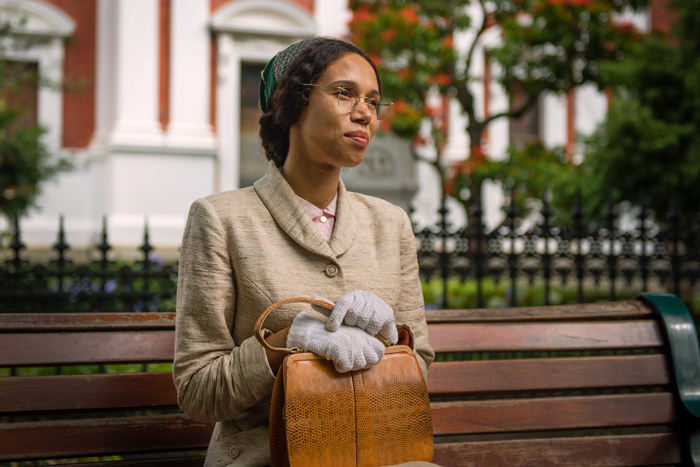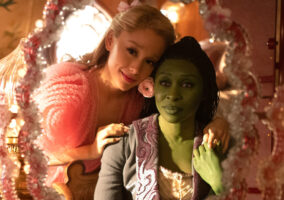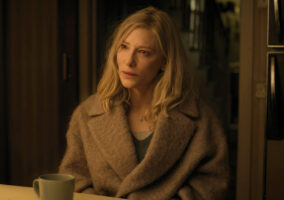
The “little stinker” sides of our personalities wanted so desperately to open this with some sort of take on “Phasers were set on STUN!” just to wind up our fellow nerds a little with an inappropriate reference, but we couldn’t find a non-dumb way of doing it. Suffice it to say, this episode left us well and truly stunned – in every sense of the word. First, we were stunned and surprised to find out our initial cringing at the news of a Rosa Parks-themed Doctor Who episode was completely unfounded. Second, we were stunned by the welling of emotion this episode stirred in us. We’re never the kinds of queens ashamed to admit they cried over a piece of pop culture so we have no problem telling you we were pretty wrecked by the time Andra Day’s soaring vocals filled our living room.
We didn’t go into this episode with the highest of hopes for it. Jodie Whittaker’s debut as the Doctor (along with Chris Chibnall’s debut as the new producer) was a brisk and competent affair that neatly set the history-making casting of the first woman in the lead role into place, no muss or fuss. The second episode of the season, “The Ghost Monument” was similarly low in stakes and rather breezy in its emotion. We have no real complaints about how the new team is working, but going into this episode, we would not have claimed that they’ve quite settled into their groove yet or figured out their direction. Which was okay by us because it’s not unheard-of for a new show team and lead to need time to get their bearings – especially on Who, which requires the lead to slot herself into line with a dozen other portrayals of the same character. But we’d be lying if we didn’t say we were not looking forward to this episode at all, partly because the team hadn’t quite gelled yet, but mainly because it takes quite a bit of finesse, restraint, knowledge and sheer talent to execute a good hour of sci-fi television that examines the history of racism by inserting itself directly into historical events. And because Doctor Who is a British show and Rosa Parks’ story is woven directly into the most important aspects of 20th Century American history (where she resides as a still-controversial yet hugely culturally important figure to this day), we had a very difficult time believing they wouldn’t miss some nuance or mischaracterize some aspect of American culture. The show has traveled to the States several times over its run and while it never truly lapsed into any sort of offensive stereotyping of Yanks, it nonetheless gleefully dove into some fairly well-worn tropes (cowboy hats, guns, Elvis and astronauts, mostly).

And time travel fiction has infamously struggled with how to portray a past that only gets more overtly and violently racist the further back you go. Doctor Who has only had a handful of companions of color, and occasionally tipped its hat to the difficulties of taking them into the past, but like so much time travel fiction, the sometimes shocking attitudes and practices of the past in regards to things like racism, misogyny, and other forms of prejudices, tend to be waved away, almost by necessity. You have to suspend so much disbelief with a time travel story, the thinking seemed to be, that the shock of how racism was expressed in history is simply another item in a long list of hand-waving.
So all of this – an unformed team, a different culture, an extremely spotty genre history on the topic – left us wary going into the episode, our expectations as low as we could possibly keep them. There was something we didn’t count on, however – and it became more obvious as the episode ticked on. In fact, Yaz and Ryan’s discussion next to the trash bins about their frustrations as people of color in 1955 and the parallels to their frustrations as POC in 2018 had us scrambling directly to IMDB to confirm what we suspected by that point. Producer Chris Chibnall co-wrote this episode with writer Malorie Blackman and hired director Mark Tonderai to execute the episode, which came to life at the talented hands of Vinette Robinson, who did a beautiful job portraying Rosa Parks. And finally, the episode closed with a soaring welling of emotions, thanks in no small part to the vocals of Andra Day. All of the people most responsible for the best parts of this episode on a seminal figure in racial history are black.
That is no small or insignificant thing. While we wouldn’t argue that white creators can’t or shouldn’t tackles these subjects, Doctor Who is a largely white-centered show with an enormously overwhelming white cast in its half century history. If Chris Chibnall really wanted to tackle this story, he did exactly the right thing by centering the voices and expertise of black people to tell it. Those creators in turn did the right thing by not interfering with history, not trivializing the figures they’re depicting, and most important of all, not centering the opinions or perspectives of its white characters. “We have to not help her,” The Doctor implores to a horrified Graham (not insignificantly the only white people in the cast), as it dawns on them both that they have to just sit (or stand) there in their whiteness and let the fact of it spur on history. It is a stunning line and setup that recognizes privilege while at the same time respecting history. And while it’s possible a team of white creators could have executed that moment, we find it hard to believe they could have done it nearly as well. Just as Ryan and Yaz’s conversation about the history of racism and their own experiences with it has much more depth when people of color are putting those words in their mouths and directing the scene in which they’re said.

Shifting our focus a little, this episode also offered the pleasure of watching all the main characters suddenly snap into place, in both the writing and the performances. We knew Whittaker would be good, but her scenes facing off against new villain (because don’t even try to suggest we’ve seen the last of him) Krasko were hairs-on-the-back-of-the-neck good. We will refrain from comparing her to previous actors in the role, but she absolutely nailed that quality of The Doctor where the character suddenly shifts from being a humorous figure to a chillingly smart and threatening one. In fact, if there’s one thing about the new version we love the most, it’s the show’s insistence on portraying her cleverness and technical adeptness. If it’s nothing but gadget-making and well-executed plans for the foreseeable future, we’re fully on board.
And speaking of on-board (they segued badly), the new team of Yaz, Ryan and Graham suddenly seem well-defined and loaded with chemistry this episode. More important, they suddenly feel indispensable to this version of the Doctor, which is a pretty neat trick this early in the run. Each of them bring distinct strengths to the team and their interactions are thick with emotional weight because they share a past and some of them are in shared mourning. We sincerely hope they don’t move forward with a Yaz and Ryan romance, which was kind of hinted-at here. But the real surprise is Bradley Walsh’s performance as Graham, which is just gung-ho enough to be fun, but occasionally tempered with humor and moments of surprising emotion, like his recounting of his first meeting with Grace or his horror at watching Rosa Parks being ordered to give up her seat for him.
By threading the needle perfectly on an important and ambitious story that they didn’t have to tell; by making sure the correct people were put in place to do the telling; and by literally every person involved bringing their smartest, most sensitive A Game to the proceedings, the new team on Doctor Who haven’t just settled into their groove, they carved out a place in the show’s history by producing one of its very best episodes ever.
Cate Blanchett in Maison Margiela at the Rome Film Fest “The House with a Clock in Its Walls” Screening Next Post:
Lily Collins and Robert Pattinson, Pretty But Dull at the GO Campaign Gala 2018
Please review our Community Guidelines before posting a comment. Thank you!



